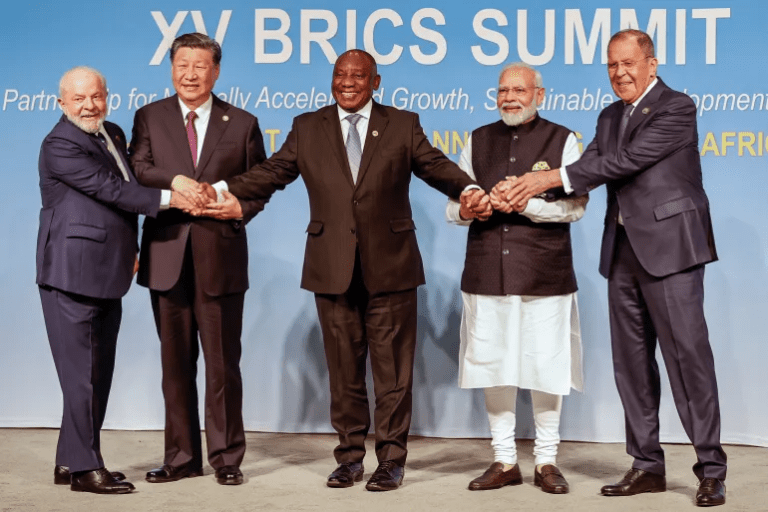This week’s BRICS Update brings exciting news for all aspiring world leaders: Six countries have been invited to become members of the group! Argentina, Egypt, Ethiopia, Iran, Saudi Arabia, and the United Arab Emirates have all received invitations to join the emerging markets group. South African President Cyril Ramaphosa hosted a three-day summit of the group in Johannesburg, where the new members were announced. For those interested in pursuing a career in international relations, this development could be a great starting point. With the help of IAS coaching in Delhi, you can learn more about the BRICS countries and their importance in the global economy.
The 6 new countries invited to join BRICS
This week’s BRICS Update has brought exciting news for all aspiring world leaders. South African President Cyril Ramaphosa has announced that six countries have received invitations to join the emerging markets group, BRICS. The new members include Argentina, Egypt, Ethiopia, Iran, Saudi Arabia, and the United Arab Emirates.
Each of these countries brings unique contributions to the group. Argentina, known for its strong agricultural sector, will enhance BRICS’ influence in global food production. Egypt, with its strategic location and historical significance, will strengthen the group’s presence in the Middle East. Ethiopia, with its rapidly growing economy and ambitious development plans, will add a dynamic energy to the group.
Iran, with its vast oil and gas reserves, will enhance BRICS’ energy security and diversify its energy sources. Saudi Arabia, as one of the largest oil producers in the world, will bring valuable expertise in the energy sector. Lastly, the United Arab Emirates, with its strong financial services industry and booming tourism sector, will contribute to BRICS’ economic growth.
The inclusion of these six countries in BRICS will not only broaden the group’s economic base but also strengthen its political influence on the global stage. This expansion signifies a shift in power dynamics and highlights the growing importance of these countries in the international arena. Aspiring world leaders can take advantage of this development by learning more about these countries and their significance in the global economy. With the help of IAS coaching in Delhi, you can gain the necessary knowledge and skills to excel in the field of international relations and contribute to the success of BRICS.
Benefits of joining BRICS for Argentina, Egypt, Ethiopia, Iran, Saudi Arabia, and the United Arab Emirates
The invitation for Argentina, Egypt, Ethiopia, Iran, Saudi Arabia, and the United Arab Emirates to join BRICS comes with a multitude of benefits for these countries. First and foremost, joining BRICS will provide them with access to a platform of emerging economies that have significant global influence. This will enable them to engage in dialogue and cooperation with other members, which can lead to increased trade opportunities, foreign investment, and economic growth.
By joining BRICS, these countries will also benefit from the collective strength and bargaining power of the group. BRICS represents a significant portion of the world’s population, economy, and natural resources. This gives them a stronger voice on the global stage and the ability to shape global governance systems to their advantage.
Furthermore, membership in BRICS provides a platform for these countries to address common challenges and concerns. Whether it is issues related to energy security, climate change, or regional conflicts, BRICS offers a forum for collaboration and finding mutually beneficial solutions.
Joining BRICS also opens up avenues for technical assistance, capacity building, and knowledge sharing. The existing members have expertise in various sectors such as agriculture, energy, infrastructure, and finance. This can greatly benefit the new members by helping them address developmental challenges and learn from the experiences of their counterparts.
In summary, joining BRICS offers Argentina, Egypt, Ethiopia, Iran, Saudi Arabia, and the United Arab Emirates a range of benefits, including increased economic opportunities, enhanced global influence, and access to technical expertise. This presents an exciting opportunity for these countries to strengthen their position in the international arena and contribute to the collective progress of the group.
Impact on global politics and economy
The inclusion of Argentina, Egypt, Ethiopia, Iran, Saudi Arabia, and the United Arab Emirates in the BRICS group will undoubtedly have a significant impact on global politics and the economy. These new members bring diverse perspectives, resources, and strategic positions to the table, further strengthening the group’s influence and shaping the global order. From a political standpoint, the addition of these countries will diversify and expand the group’s diplomatic reach. BRICS will now have a stronger presence in the Middle East, with the inclusion of Egypt, Iran, and Saudi Arabia.
This will give the group more leverage in addressing regional conflicts, promoting peace, and ensuring stability in the region. Additionally, the presence of Argentina, Ethiopia, and the United Arab Emirates will contribute to a more balanced representation across continents, providing a platform for global cooperation and fostering greater understanding between different regions.
In terms of the economy, the inclusion of these new members will have a profound impact. Argentina, Iran, and Saudi Arabia are major oil producers, while Ethiopia and Egypt possess significant agricultural resources.
The United Arab Emirates has a thriving financial services industry, and each of these countries has a rapidly growing economy. The collective strength of BRICS, now with a broader economic base, will solidify the group’s position as a major player in global trade and investment. This will lead to increased cooperation, expanded market access, and enhanced economic growth for all members.
Overall, the inclusion of these six countries in BRICS marks a significant shift in the global power dynamics. It will shape the future of global politics and the economy, presenting new opportunities for collaboration, development, and prosperity. Aspiring world leaders should closely monitor these developments and recognize the potential they hold for their own careers in international relations.

